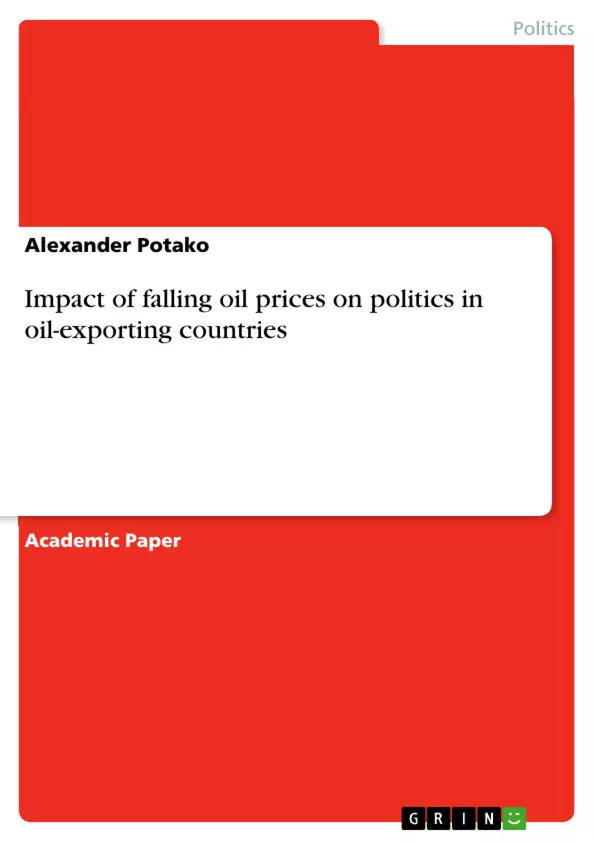The last 18 months were characterized by a dramatic decrease in average oil prices from more than $110 per barrel in July 2014 to less than $31 in January 2016. Such a decline has already resulted in serious economic changes worldwide. However, the decline will also result in substantial political changes in oil-extracting countries because previously established terms of social contract will be undermined while governments will lose most of resources, which enabled them to preserve control, not to mention weakening international position.
Inhaltsverzeichnis (Table of Contents)
- Impact of falling oil prices on politics in oil-exporting countries
- Oil Prices and Social Contracts
- Venezuela: A Case Study
- Oil Prices and Security
- Bahrain: A Case Study
- Oil Prices and International Politics
- Russia: A Case Study
Zielsetzung und Themenschwerpunkte (Objectives and Key Themes)
This article examines the impact of falling oil prices on the political landscape of oil-exporting countries. It explores how the decline in oil revenues affects domestic and international dynamics, particularly in the context of social contracts, security, and foreign policy.
- The impact of falling oil prices on social contracts in oil-exporting countries
- The relationship between oil revenues and security spending in oil-exporting countries
- The influence of oil prices on international politics and foreign policy
- The potential for political instability in oil-exporting countries as a result of falling oil prices
- Case studies of Venezuela, Bahrain, and Russia to illustrate the broader trends
Zusammenfassung der Kapitel (Chapter Summaries)
The article begins by outlining the dramatic decline in oil prices between 2014 and 2016 and its potential consequences for oil-exporting countries. It argues that the decrease in oil revenues undermines previously established social contracts, as governments are forced to cut social spending due to budget constraints. Venezuela serves as a prominent example, where falling oil revenues led to shortages and ultimately contributed to a shift in power towards the opposition. The article then examines the impact of oil prices on security spending. It argues that reduced oil revenues can make ruling regimes more vulnerable to domestic and external threats, as they may lack the financial resources to maintain their security apparatus. Bahrain is presented as a case study where falling oil revenues might force the government to consider political compromises to address ongoing protests. Finally, the article analyzes how falling oil prices can weaken the international position of oil-exporting countries. It argues that high oil prices allowed such countries to pursue independent policies, but the decline in oil revenues reduces their leverage and opens opportunities for international pressure. The article uses Russia as an example, suggesting that its aggressive foreign policy might be tempered by the need to address economic consequences of low oil prices.
Schlüsselwörter (Keywords)
This article focuses on the impact of falling oil prices on politics in oil-exporting countries, exploring key themes such as social contracts, security spending, international relations, and foreign policy. Case studies of Venezuela, Bahrain, and Russia highlight the real-world implications of these trends. Key concepts include budget revenues, political opposition, economic recession, military spending, and international sanctions.
- Citation du texte
- Alexander Potako (Auteur), 2016, Impact of falling oil prices on politics in oil-exporting countries, Munich, GRIN Verlag, https://www.grin.com/document/465790



